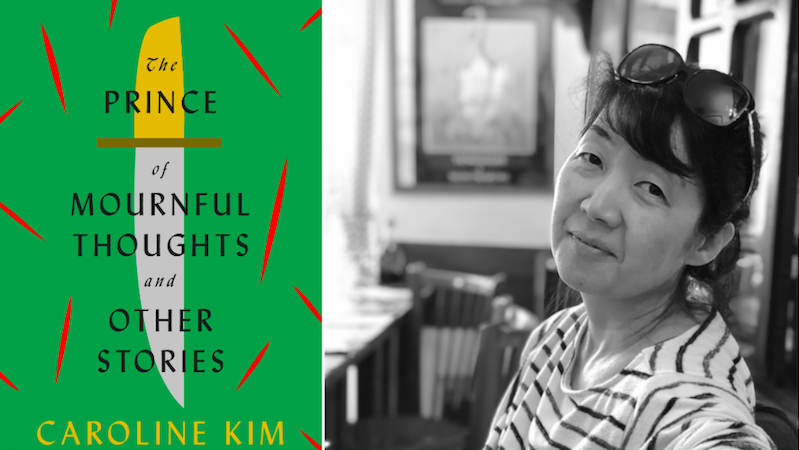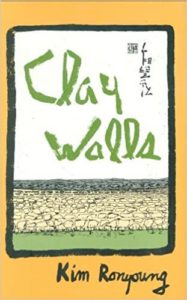
Caroline Kim’s The Prince of Mournful Thoughts and Other Stories, winner of the Drue Heinz Literature Prize, selected by Alexander Chee, is published this month. She shares five books about the Korean diaspora.
East Goes West by Younghill Kang
I came to this novel, published in 1937, shamefully late, only learning of it after reading Ed Park’s terrific essay in The New York Review of Books. I was surprised, and not a little disheartened to read how enduring the “othering” of Korean (and Asian) Americans has been, forever to be seen as foreigners. This makes the book sound depressing, which it’s not. On the contrary, the charm of Kang’s narrator, his ebullience, cheerfulness, and absolute curiosity to know everything about his new country speeds the reader along on Chungpa Han’s adventures through North America while also laying bare the painful truths of existence as an outsider.
Jane Ciabattari: Ed Park writes of East Goes West, “What if the finest, funniest, craziest, sanest, most cheerfully depressing Korean-American novel was also one of the first?” How did the Immigration Act of 1924 shape this novel?
Caroline Kim: This requires a two-part answer. First, one of the major problems with the label “Asian American” comes not just from the myriad countries and cultures under that uneasy heading, but also from the fact that immigration patterns have been wildly different, depending on which Asian country you’re talking about. For example, we all know about Chinese immigrants coming to America hoping to strike gold, but early Korean immigrants came for much different reasons—less for economic opportunities than political ones, at least to mainland America. The first Korean immigrants were political exiles, either running for their lives from Japanese authorities after the colonization of Korea in 1910, or choosing to leave Korea in order to be part of the resistance movement.
Secondly, the Immigration Act of 1924 set quotas at two percent of the total number of people from a particular country based on the 1890 census. However, Korea, once called the “Hermit Kingdom,” only opened (reluctantly) to the West in the 1880s, and the first treaty between the U.S. and Korea was only signed in 1882. This meant the probable number of Koreans in the U.S. in 1890 was miniscule. You don’t see significant emigration from Korea until 1965, when the new Immigration Act finally abolished quotas. That’s why in the novel Chungpa Han spends so much time in Chinatown. It’s the closest he can get to being with Koreans. At least, Chinese culture is familiar to him because China had long had a paternalistic relationship to Korea. Also, as part of the scholar class, Han, like his creator Younghill Kang, was well versed in the Chinese classics. In the novel, I feel acutely Han’s loneliness as an exile in a vast country where few had ever heard of Korea.

Clay Walls by Kim Ronyoung
Clay Walls illuminates a unique period of Korean American history. It’s set during the 1920s-1940s, a time when Koreans came to mainland America not for economic reasons but political ones. Considered dissidents and agitators back home, they were running from the Japanese, who had colonized Korea and were attempting to eradicate its language and culture. The last third of the novel reveals the lives of young American born Koreans, growing up in the “unrestricted” sections of L.A., jitterbugging to Count Basie, and going off to fight in WWII.
JC: In what ways does the use of three narrative perspectives—the aristocratic Haesu, her husband Chun, a farmer, both of whom immigrated to Los Angeles in the decade before WWII with very different expectations, and their American-born daughter Faye—outline the varied experiences of the Korean diaspora?
CK: By giving voice to three narrators, Kim Ronyoung is able to show three distinct realities of the Korean diaspora at that time. Haesu often finds herself contrasting, unfavorably, her hand-to-mouth existence in America working menial, sometimes degrading jobs with her comfortable, well-off childhood in Korea. She pines to go back home. Chun, a farmer’s son, finds life difficult and full of unending labor in both countries. At one point, Faye tries to hide her friendship with a Japanese schoolmate because her mother is unable to see the Japanese as anything but oppressors. Haesu’s experience contrasts sharply with Faye’s, who feels a solidarity with her Japanese friend stemming from the fact that most Americans can’t recognize any difference between them.
Your House Will Pay by Steph Cha
In this fictionalized account of a real life event that, along with the beating of Rodney King, led directly to the L.A. Riots, Cha tackles the conflicting, complicated tensions between the Korean American and Black communities of L.A. Written from the perspectives of Black and Korean American characters, it could have turned terribly wrong in the hands of a writer less skilled than Cha, who impressed me with her wise understanding of humanity. It’s also a page turner.
JC: In an author’s note, Cha notes that Your House Will Pay is based on the murder of 15-year-old Latasha Harlins in March 1991. Cha’s choice to populate the novel with characters from both the Korean American and Black communities required exceptional empathy and skill. As you say, it could have gone terribly wrong. Can you give an example of a passage that shows how Cha is able to show the tensions between the Korean American and Black communities of L.A. with nuance?
CK: There’s a scene set during the L.A. Riots when Shawn and his cousin, Ray, confront Frank, another Korean storeowner whom Shawn partially blames for his sister’s death:
“Why are you here anyway?” Ray asked. “Any of you?”
The question hung nastily in the dirty air, disappearing into the sound of the approaching sirens—fire or police? Frank straightened, standing taller behind the counter, a man defending his pride. “This is my store,” he said.
“Yeah? What, you couldn’t do this in Korea? This ain’t home for you. We don’t want you here. You think we’re stupid, yeah? You think we pay ten bucks for some potato chips and apples and we don’t know you ripping us off.”
“Do I look like rich man to you? I work hard, you steal from me, you threaten me. My friend Mike Oh, he get killed. He has family and he die for hundred dollar in cash register.”
Here I clearly feel each character’s point of view. I understand why Ray feels like Frank is ripping him off and also Frank’s frustration and fear of his customers. The tension between Shawn, Ray, and Frank isn’t only personal. Caused by forces bigger than themselves, especially a political and social structure that pits marginal groups against each other, this confrontation and the L.A. Riots, as well, are volcanic eruptions that happen when something in society has gone terribly wrong. It’s like the forces of capitalism and racism are tectonic plates pushing against each other until the pressure—greed, hypocrisy, enmity, suffering, and pain—get to be too much.
All You Can Ever Know by Nicole Chung
Although Chung’s experience as a Korean adoptee is different from others because she was born in America, she shares the same search for identity that comes from being born into one culture and placed into another. Although I’m not adopted, I related to the sense of disconnection that follows when the way you look comes with assumptions that you’re an expert on your ancestral homeland but the only experience you have is of America. This book pulses with desire to know where we come from, even if the only outcome we can expect is to know ourselves better.
JC: Chung’s search for information about her birth family makes her story particularly powerful. How has your own research on your ancestral homeland inspired the stories in your collection?
CK: In one of my many cycles of trying to educate myself on Korean history, I remember throwing my hands up and thinking, I can’t know it all! So I asked myself what ordinary Koreans would know about their history, sort of in the way in which Americans have the Mayflower and the Civil War and 9/11 in their cultural consciousness. That’s when I came upon the story of King Yeongjo and Prince Sado, a king who was forced to kill his own son. Prince Sado’s wife, Lady Hong, wrote several memoirs about the event at different times in her life with great psychological insight but not many details. As a fiction writer, I immediately found myself imagining how this could have happened, how one unfortunate misunderstanding could lead to another and another. That and how disastrous it is sometimes when we don’t receive the love we need, how badly that can change us and the course of our lives.
Minor Feelings by Cathy Park Hong
These are complicated, meaty essays that deserve multiple readings. It’s a pleasure to be Hong’s companion as she tackles the difficult-to-name, hard-to-pin-down emotions of what she calls “minor feelings,” the ones that stem from racialized experiences that aren’t in-your-face racism—namecalling, eyepulling, or offensive accents—but its more ambiguous, murky cousins that cause you to doubt yourself. Hong also gives a penetrating account of the life and death, by rape and murder, of the artist Theresa Hak Kyung Cha, digging deep into the silence around the sexual assault of Asian American women.
JC: “Unlike the organizing principles of a bildungsroman,” Hong writes, “minor feelings are not generated from major change but from lack of change, in particular, structural racial and economic change.” She makes an eloquent call for change: “I also hope that we can seize this opportunity and change American literature completely. Overhaul the tired ethnic narratives that have automated our identities; that have made our lives palatable to a white audience but removed them from our own lived realities—and stop spelling ourselves out in the alphabet given to us.” Do you think she is right, that your generation will change American literature so it can reflect your own lived realities?
CK: I think it’s already started to happen. During the pandemic, I’ve been reading through my ever-growing pile of books written by Korean Americans, and have been amazed at the diversity of characters, experiences, and insights. Not all Korean American writers even have Korean Americans as protagonists. I’m thinking of Ed Park’s humorous office satire, Personal Days, and James Han Mattson’s timely The Lost Prayers of Ricky Graves. I once read that Koreans who immigrated to America dispersed more widely than other Asians, moving into smaller, all-white towns where they were the only Korean family or only one of a few. That was my experience in America, and probably shaped who I am more than any other. It’s one of the reasons I am so excited to see Lee Isaac Chung’s Minari. Much of how much the American literary landscape will change depends on access. The more Korean American writers get published, the more our varied realities will just naturally become part of American literature.
*
· Previous entries in this series ·
If you buy books linked on our site, Lit Hub may earn a commission from Bookshop.org, whose fees support independent bookstores.

